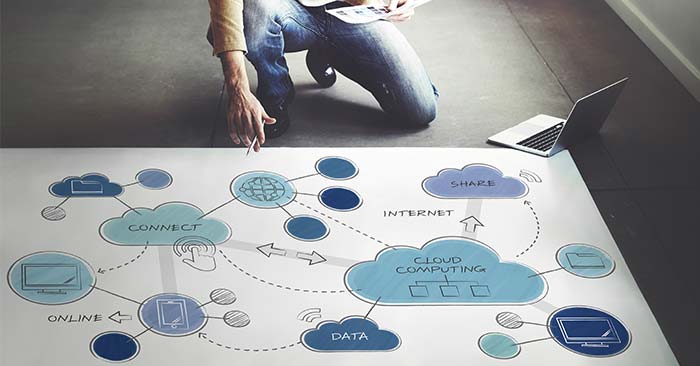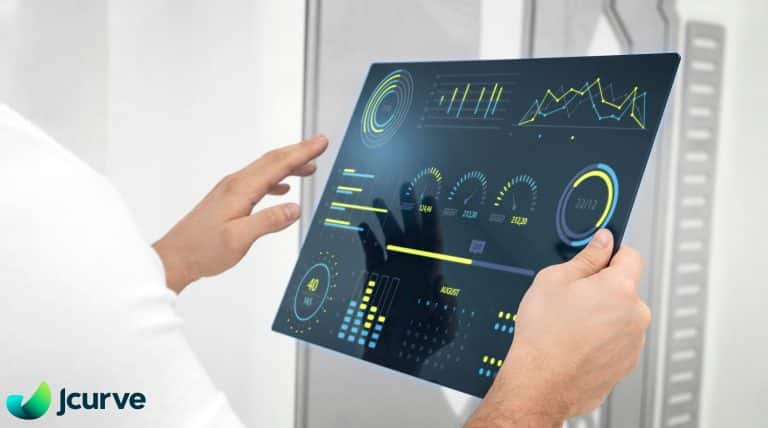Providing an ERP definition isn’t as simple as telling you it’s an acronym for Enterprise Resource Planning. Or even that ERP is a business management system which brings all parts of your business together. ERP is software for your business which helps you improve the way you do business.
If you’re asking yourself the question, “What is ERP?”, chances are you’ve been working with business management systems that aren’t giving you the functions or visibility you need.
What are business management systems? They’re software applications which run parts of the business. For small businesses, it could be the Excel spreadsheets used to track inventory, the accounting system for financials or the shared calendar system for tracking sales appointments. For larger businesses, it might be the backend system managing financials, a separate system to track sales and inventory, and another for Customer Relationship Management (CRM).
You may have noticed a recurring theme already – many systems running separately to manage different business functions. This is where ERP comes in. ERP is a business management system for your entire business. One, consolidated software platform that understands what’s happening across sales, CRM, inventory, accounting, purchasing, etc. and brings it all together.
Despite its name, Enterprise Resource Planning, it’s not just for big businesses anymore. SMBs are leveraging ERP to improve their business performance early on and gain a competitive advantage. ERP is now something which helps SMBs and larger businesses alike – by helping them reduce costs, improve efficiency and grow their profitability.
See our video explainer, What is ERP?, for a concise 2-minute overview.
What is ERP used for?
When you choose the right ERP system, it can not only replace your existing business systems but also add improved functionality. Some of the core functions that an ERP system consolidates into the one platform can include:
Warehousing and inventory management
If you’re an inventory carrying business, inventory management can be what makes or breaks your business. Matching supply to demand is a delicate balance that, when optimized, can create increased stock turn and result in greater cash flow.
ERP can provide better control and increase visibility on company cash flow, financial trends, credit control, tax and BAS management.
Human Resources (HR)
HR becomes simpler managing everything within the one platform. Role-based security ensures the right level of access for employees. Leave can be requested and managed in the one system and a full history of all employee record changes tracked.
“When you choose the right ERP system, it can not only replace your existing business systems but also add improved functionality.”
Sales and marketing
Get your sales and marketing activities working more closely together. With single-source data that understands sales trend information, more targeted marketing campaigns can be developed and deployed. Marketing lists are generated from existing CRM data, which means higher data accuracy, easier subscription management and more intelligent audience segmentation.
Customer Relationship Management (CRM)
When you have all customer information in a system that’s accessible by everyone, it creates a more consistent experience for customers, regardless of whom they’re contacting from your company. As soon as they’ve had a conversation with a sales rep or your accounts department, it’s noted against the customer record. Having a full history of all interactions also helps sales gain a deeper understanding of the customer’s relationship with your business, the products and services in which they’re interested, and any potential issues as they arise.
The real value of ERP


Increased efficiency, lower operational costs
When everything is working from a single data source, and you have visibility across the business, it provides an opportunity to streamline business processes. More efficient processes means less manual time and effort spent managing them. This also equates to reduced operational costs.
Cross-department collaboration
Over time, many businesses start to develop “silo syndrome”. Staff become so focused on their operational areas that they lose sight of the bigger picture. ERP provides a common platform for everyone; not just to see information from across the business, but also to collaborate. Finance can see a full history of customer interaction, which may include reasons for payment delays. Sales can see ATS (Available to Ship) stock that accounts for all back orders and reservations. Managers can see calendars, tasks and reminders.
“When everything is working from a single data source, and you have visibility across the business, it provides an opportunity to streamline business processes.”
Better insights
Bringing data together from across the business allows reporting with multiple data sets. It can begin to yield some interesting trends and relationships. Is your warehouse stock turn being affected by purchasing that’s not matched to demand? Is your cash flow being impacted by reduced stock turn? Getting the right data on how different parts of the business affect each other gives you valuable insights. Make better predictions and agile business decisions, based on data-driven insights.
There’s still much more to explore with the value an ERP provides but the top reasons around operating costs, collaboration to deliver a better customer experience, and insights that empower agile business decisions are some of the most important to businesses that need an ERP solution.
What is cloud ERP?


With a cloud ERP system, the ERP vendor provides the hardware and infrastructure needed to run the software. Your ERP is deployed from the cloud and the ERP implementation managed by a team of experts who can guide you through things, step-by-step, no matter where you are.
Cloud ERP benefits for SMBs
Since the inception of cloud ERP, many cloud-based applications have come onto the market with affordable options. Due to the number of platforms out there, it’s created some confusion over what is cloud ERP software for SMBs. Some cloud software vendors offer robust accounting and financial capabilities but require other stand-alone systems to be integrated to synchronize data such as inventory, CRM, sales and marketing. These aren’t true cloud ERP systems as they’re not leveraging single-source data or real-time information. Cloud ERP applications such as JCurve ERP, however, manage all core business functions within the one application.
Some of the immediate benefits SMB cloud ERP solutions deliver include:
- Leveraging best practice processes to improve efficiency
- Getting the business using single-source data
- Reducing costs through automation
- Creating a more consistent customer experience
- Dashboards and KPIs to see the business position at a glance
For small businesses, cloud ERP can help set the same best practice processes that enterprise level organisations are using.
Given the number of cloud software options available, it’s worth researching the options and contacting your shortlist of solution providers when you’re ready to understand which system will be best suited to your specific business requirements.
“For small businesses, cloud ERP can help set the same best practice processes that enterprise level organizations are using.”
Cloud ERP benefits for larger businesses
Larger business and enterprises often have different priorities and requirements to SMBs. Even though cloud ERP has become more accessible to businesses of all sizes, options tailored for bigger businesses are available, such as NetSuite, to focus on those different requirements.
Some of the benefits enterprise level ERP solutions deliver include:
- Increasing overall profitability
- Strong compliance and risk management
- Improved project management
- Increasing cross-department visibility and collaboration
- Dashboards and KPIs to see department and overall business performance
Industry-specific editions are available for segments such as wholesale distribution, manufacturing, retail, and many others.
Which ERP system to choose?
When it comes to figuring out which ERP system to choose, it can seem like an overwhelming task. There are many options out there, and many factors to consider. Businesses also have different needs, being at differing growth stages or having specific processes in place. This is where it can pay to contact an ERP provider to discuss your individual business requirements and get some more advice.
It can also help having a free infographic outlining what you need to know when choosing ERP software.
So you now know that an ERP system is consolidated business management software that brings together all parts of your business. ERP leverages single-source data to gain better business insights. Going a step further with cloud ERP software, you’ll be able to work with real-time information that empowers agile business decisions to be made, the moment they need to be made.
If it sounds like ERP software is what your business needs to reduce operating costs, increase efficiency and improve business growth and performance, get in touch to start a discussion or dive into even more detail with the ERP Buyer’s Guide.









